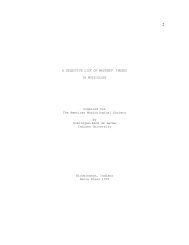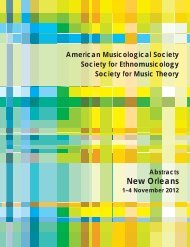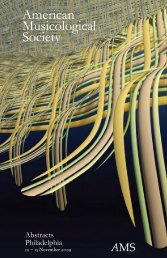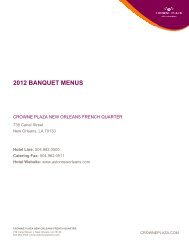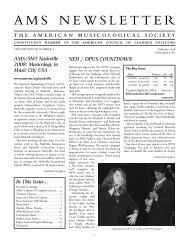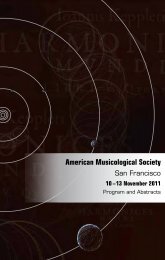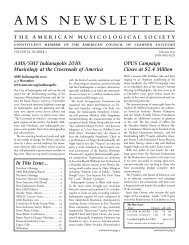Abstracts - American Musicological Society
Abstracts - American Musicological Society
Abstracts - American Musicological Society
You also want an ePaper? Increase the reach of your titles
YUMPU automatically turns print PDFs into web optimized ePapers that Google loves.
30<br />
FridaY morning<br />
musical and artistic value to less exalted genre.s' by<br />
recognizing the common roots in appar€nt1y<br />
phenimena l!Iagner/Brahns, Beethoven/Rossini)' ^1iY::t" DahrrLaus<br />
has raised the level of discourse about<br />
nineteenth-century nusic and cornpelled scholars in all<br />
specialized areas to expand thelr concerns above the<br />
particular.<br />
Yet there ate serious problems with Dahlhaus'<br />
approach to music history, many centered on his crucial<br />
concept of the " ideal type. " Holtever intellectually<br />
appealing his critical speculations and syntheses rnay<br />
be, they often rest not on a careful consideration of<br />
the nusical evidence but on abstract "ideal types'<br />
which, upon examination, too often fail to describe<br />
accurately his oltn examples, 1et al-one the broader<br />
musical phenomena they are meant to exenplify. Drawing<br />
upon various sections of Die Musik des 19.<br />
Jahrhunderts, this paper will attempt to explore the<br />
critical problern of reconciling brilliant insights qtith<br />
faulty evidence and to consider alternatives to the<br />
"ideal type. "<br />
ERLAUTERUNG AND SCHENKER<br />
Ian Bent, University of Nottinghan<br />
and Colunbia University<br />
In the literature of music, the term Erleuterung<br />
is now inseparably linked with Heinrich Schenker. In<br />
1910 , he issued his study of J . S . Bach: Chronatische<br />
Fantasie und Fuge, subtitled Erlbuterungsausgabe. In<br />
L9l3-2L, he published his stil1 more famous Beethoven:<br />
Die letzten funf Sonaten, widely known as the<br />
ErlSuterungsausgabe. What did ErlSuterung mean to<br />
Schenker? Did it have an ancestry in writing about<br />
music? Investigation shows the tern to have been used by<br />
many vriters, including Moritz Hauptmann (1841) , Ernst<br />
von Elterlein (1854, 1856) and F. L. S. Dtirenberg<br />
(1853). Later, two najor series were predicated on it:<br />
Bechhold's Meisterfiihrer (1894- ) , whose anaLysts<br />
included ErIanger, Helrn and Riemann, and Reclam's<br />
ErlAuterungen zu Meisterwerken der Tonkunst (c. 1900) .<br />
Does this succession represent merely a weak usage of a<br />
comrnon term? Or does it constitute a genre of writing,<br />
with its own aesthetic basis? And does it connect up<br />
with Mattheson's so-designated self-analyses in his<br />
Exenplarische Organisten-Probe of L7 19? What can hte<br />
learn from observing the use of such terms as<br />
analysieren. d6composer and clq-Ulqlsli4 about the strands<br />
of analyticaJ- actiwity in the nineteenth century, and<br />
their convergence at that significant Point in history<br />
about 1910?



